Choosing to leave the routine and start a journey is not an easy task. One of the main decisions we make before jumping into the adventure is where do I go first? How do I start? In recent years, Australia and New Zealand have become very common destinations for travellers, and today we would like to find out which of these options is the best place to live, travel or work. Both countries, although very close, are very different and offer completely different experiences. This is why we interviewed Denisse, a traveller who has experience in both countries with the Work and Holiday Visa. She gave us some details about what living in each country is like and a few recommendations on how to start your adventure. Read it until the end!
Denisse, ¿where was your first Working Holiday Visa and why did you choose that place?
My first Working Holiday Visa experience was in New Zealand. To be honest, I chose that country because, at that time, it was the only one I knew that had Working Holiday Visa schemes. I’m from a small city where I didn’t have such easy access to certain kind of information as I would have had in big cities. Nor had I friends or acquaintances who were travellers, so learning about this topic was for me a process of investigation that took me quite some time.
When I moved to Córdoba (one of the biggest cities in my country) to go to University I met many people with many different life stories and interests. A few of them mentioned the idea of working in exchange for accommodation or low-cost flights for example, and that’s how I started learning about all that. I didn’t know there were so many ways to travel on a low budget.
One day at Uni, a classmate told me she wanted to get a Working Holiday Visa to go to New Zealand. She explained to me that the Visa allowed her to work there for one year. I realized at that moment that I had found my own ticket to get into the world. Working while travelling made much more sense for me, at least at that time, than the idea of staying home and going to an office every day, just to get 15 days of holidays in summer.
And that’s how I ended up applying for my first Working Holiday Visa and starting my nomad life.

New Zealand
¿When did you travel to Australia with a Working Holiday Visa and Why?
I travelled to Australia in November 2018. Living in Australia had never been on my plans but many people I met travelling told me the economy was really good and you could earn money for travelling. Maybe that was my main motivation as I wanted to save money in a short period of time to make a long trip. But, since I love nature, the idea of visiting the country with the most exotic animals of the world was also very exciting.
Many people I met travelling told me Australia was better than New Zealand in many ways but my experience was very different from what I was expecting. Life gave me a lesson: the first four months in Australia I struggled to find a stable job to settle and save some money. Fifteen days after I had set foot in Australia I found a job handing out flyers in the street and also working in exchange for accommodation. First I did it in Sydney and then I did it in Perth.
I must say that I was not willing to do just any type of work as I have done in New Zealand before. Factories, farms, vineyards, for example, were out of question this time so my options were narrowed. Also, the fact that I was in big cities where competition is higher made it more complicated.
Anyhow, those months gave my greed a very important lesson and left me much more important things than savings: I made many new friends, I spent New Year’s Eve in Sydney, which was on my wish list. And I also got to know Sydney all around, the flyer distribution job made me change my location every day and I had to go to places that I wouldn’t have visited as a tourist.
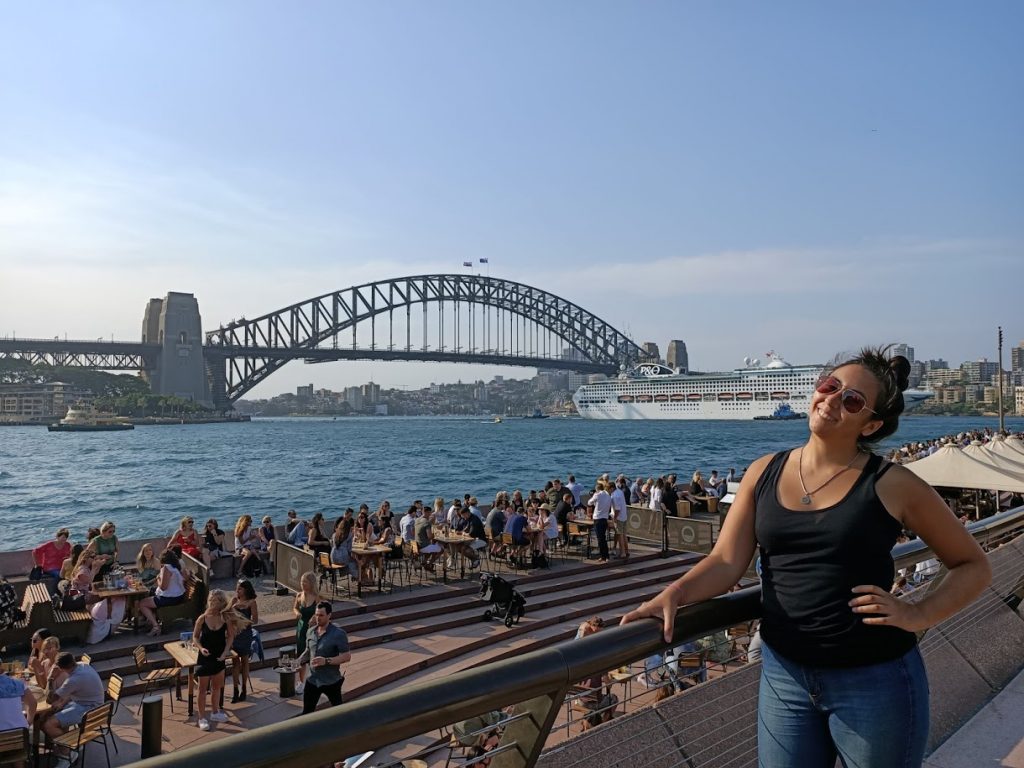
Harbour Bridge Sydney
How much does the visa cost in each country and how was the process to obtain it?
New Zealand Working Holiday Visa costs USD 180 today (July 2020) but when I applied for it in 2016 the cost was lower. The process was a roller coaster of feelings. I was sure I wanted to travel, it didn’t matter if it was New Zealand or Brazil (my plan B at that time). Gisela, a friend’s friend, was already in New Zealand with the Working Holiday Visa and she helped me from there to get mine. We both got online on the application day and we were both trying to obtain the Visa for me. As the Visa doesn’t have many requirements, a lot of people try to obtain it every year and the website collapses. Gise was lucky, she could fill the form and make the payment from her smartphone with bad reception, according to what she told me. I couldn’t even log into the web site.
I was very lucky, I guess everything happened as it had to. A few days later, I travelled to Córdoba to get my X-Ray done, which is a requirement for the Visa approval, and after the Doctor sent them to New Zealand Immigration by email it was all done. My Visa was approved and I could start planning the trip.
To save the money I needed to travel I had to figure out how to do it in a country with a complicated economy and I had to make some personal sacrifices. You can read a bit more about that on my Blog.
The Australian Working Holiday Visa costs USD335. I decided to apply for it when I was still in New Zealand, where I took the IELTS Academic English exam at Massey University in Wellington. The exam is one of the requirements.
After that, I travelled to Argentina to visit my family and I gathered all the paperwork necessary to apply: copies of my Bachelor’s Degree, of the IELTS exam qualification, bank statements, among others. It was 2018 and at that time the application had to be done in the Embassy, so I sent all the papers by post mail to Buenos Aires. Today, the application process is easier because it’s online. I got the approval and a few months later I travelled to Australia. This time was easier for me with the money issue because I had already saved for it in New Zealand, where the currency is stronger than the Argentinian Peso.
¿What kind of jobs did you do in Australia and New Zealand?
In New Zealand I did many kinds of jobs: I worked as fruit picker and packer, in factories, vineyard pruning, as a cellar hand, dishwasher, waitress, housekeeping, among others. But the one I really liked and enjoyed the most was being Hotel Receptionist. I sent my resume by email to a hotel called Kings, located in Tongariro National Park because I wanted to work in the ski season. A few days later the manager called me for an interview. My plan when I left Argentina was to learn as much as possible from the Hospitality and Tourism Industry and that was my chance to start. I loved that job. It was not just folding a cardboard box for hours like in the factories I used to work to. To be a Receptionist I had to “use my brain”: speak in English all the time, answer the phone, sell rooms, explain the touristic activities available in town and solve situations. Moreover, thanks to that job I got to learn how to ski.
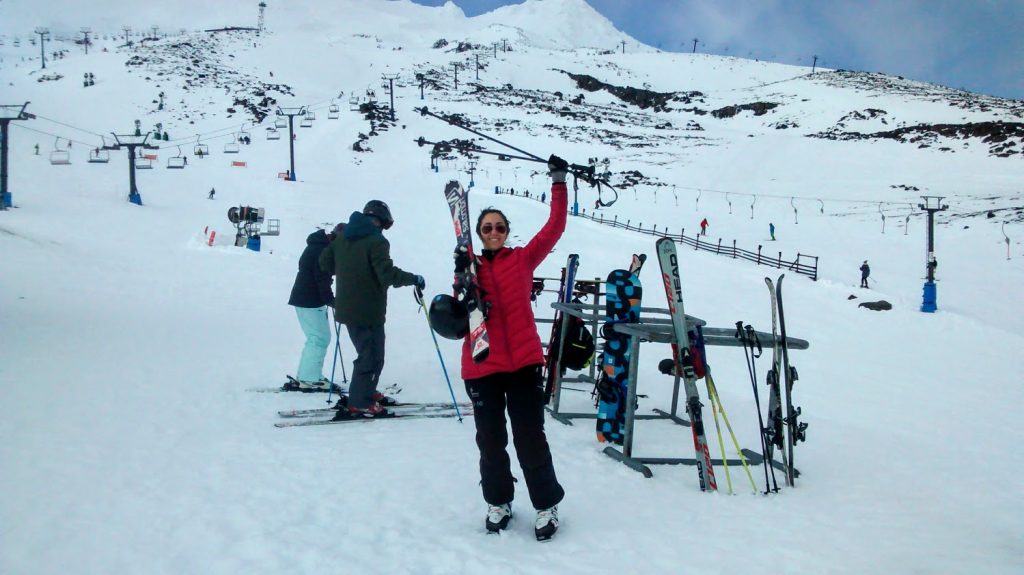
New Zealand Ski season
In Australia everything was different. I had already tried many types of jobs in New Zealand so I knew what I really liked and what I truly wanted to do in this second experience with a Working Holiday Visa. I only wanted to do jobs I knew I would enjoy. In New Zealand, I loved trying and learning from different experiences but many times I did jobs I didn’t like just because I didn’t have any other option. As I travelled a lot around “kiwi-land” I was always short of money and every time I arrived to a new place I had to start working as soon as possible. So the first job I got offered was the one I was taking.
My plan in Australia was to move less and stay for quite some time in one place, to be stable. And I have also decided I would keep learning about Tourism and Hospitality so I was focusing my job search on that. In Sydney, I made trials for two ice-cream shops but I didn’t get the job. One day I was walking on the street and saw two boys handing out flyers and I asked them for their employer contact information. Two days after I was working with them and also doing work for accommodation in the hostel I was staying at.
I moved to Perth and did the same for one month. Big cities were not the best option for me to be stable so I decided to go remote and I headed to the Australian outback. I went to Broome, a beautiful town north of the Tropic of Capricorn where I worked as a Hotel Receptionist for six months. I enjoyed my job a lot and on my spare time, I could go to the beach or camping with friends. I had never had such a relaxed life before.

Australia Hotel Reception
What is the average salary and savings in each country?
One of the most frequent questions I get is “Where is it better to live? Australia or New Zealand?”. The truth is that every experience is different and that depends on each person’s priorities and ideas of a “better lifestyle”. Regarding wages, I will explain my experience in each place:
In New Zealand, the minimum hourly wage is around NZD18,90 (USD 12,13) when I went to the country the minimum was NZD 15,75 (USD 10,11). Working in a factory ten hours a day (a few hours more or less) I used to earn between NZD 600 and 900 (USD 385 – 618). After taxes and living expenses, I could save around NZD 300 and 500 per week (USD 192 – 288). If I worked more hours I could save more but I had always got paid the minimum.

New Zealand
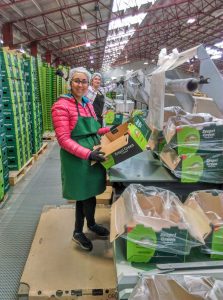
Kiwi Season
In Australia, wages are better. The minimum per hour is AUD 19,49 (USD 13,37) but normally you get paid more than that. Working as a Hotel Receptionist in Western Australia and in a remote town I was paid AUD 27 (USD 18,52) hourly on weekdays. On weekends the wages were higher and working 38 hours I could save around AUD 400 and 600 (USD 274 – 411), depending if I worked weekends or extra hours.
I would like to point out that this is just my experience. You can earn more or less depending on several aspects. Each case is different.
What was your experience travelling around Australia and New Zealand? Was it possible for you to save money to travel?
I believe I travelled more around New Zealand than around Australia, not in kilometres but in quality. New Zealand is a small country and that makes it easy to go all around. Within a few hours drive, I could camp in a completely different landscape view each day and that was just amazing. New Zealand’s natural beauty is stunning. And the country is very well prepared for camping and for caravan tourism as well.
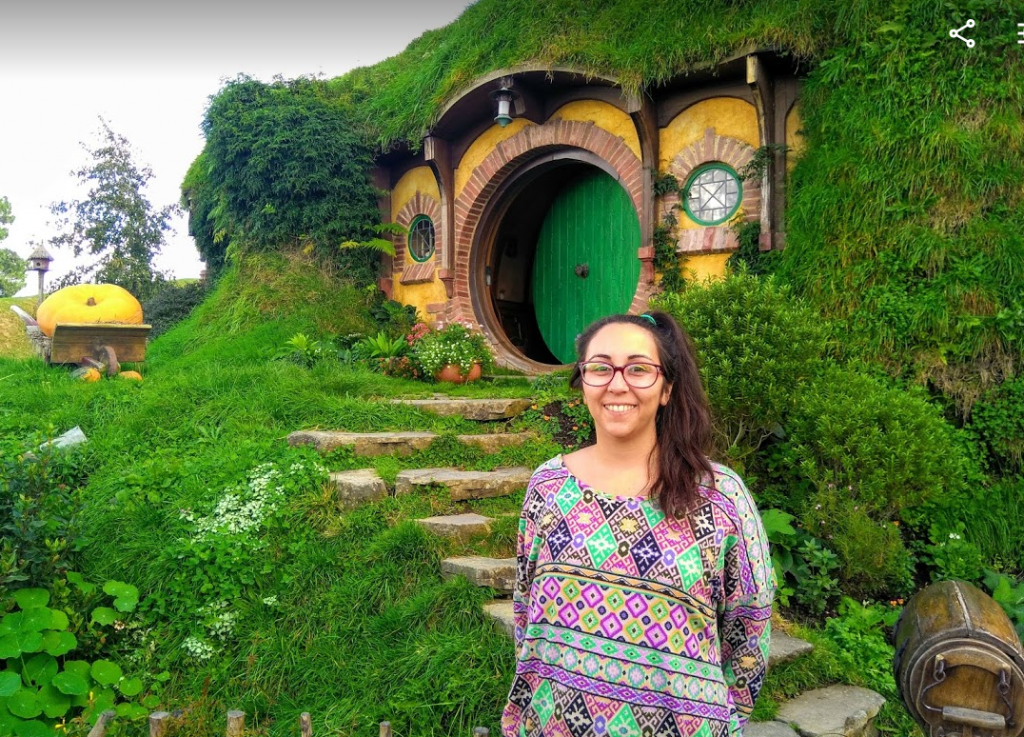
Hobbiton, New Zealand
At the beginning of my Australian Visa, I have been three months in Sydney and one in Perth. I met a friend there and we rented a car to go on a 2500 kilometres road trip to Broome. The trip was very long and got hard at one point. Australian desert has extreme weather, it is very isolated and before start rolling on the road, there are a number of very important recommendations to consider.

The Pinnacles Desert, Australia
In both countries, I was able to save money to travel but both are very expensive and sometimes it’s hard to keep on the go without an income. It’s important to save quite an amount before deciding to move.
I used to stay and work in one place for a few months, visit the surrounding areas and then move to a different place. And almost at the end of my Visa, I went to Asia where I could make a long trip with a low budget.
Where do you think English was more important for work or for daily bases?
English was important for me in both Australia and New Zealand because I was looking for a job in Tourism and Hospitality, where you have to speak all the time.
But I must say in New Zealand English is probably not as important as in Australia. On one hand, because there are a lot of Spanish speakers around the country and, at least in my experience, there is always someone that helps you out with language. On the other hand, New Zealand is a country with a lot of factories and few people, so labour workers are on high demand and most of the times you don’t even have to speak at work. As long as you are able to understand instructions and communicate at a minimum level, it might be enough.
In my opinion, in Australia speaking English is very necessary especially if you don’t plan to be in big cities or in touristic areas where you can find many Spanish speakers. You can still find a job without knowing English but it could be more difficult.
In Australia, English is definitely more important, in my experience.
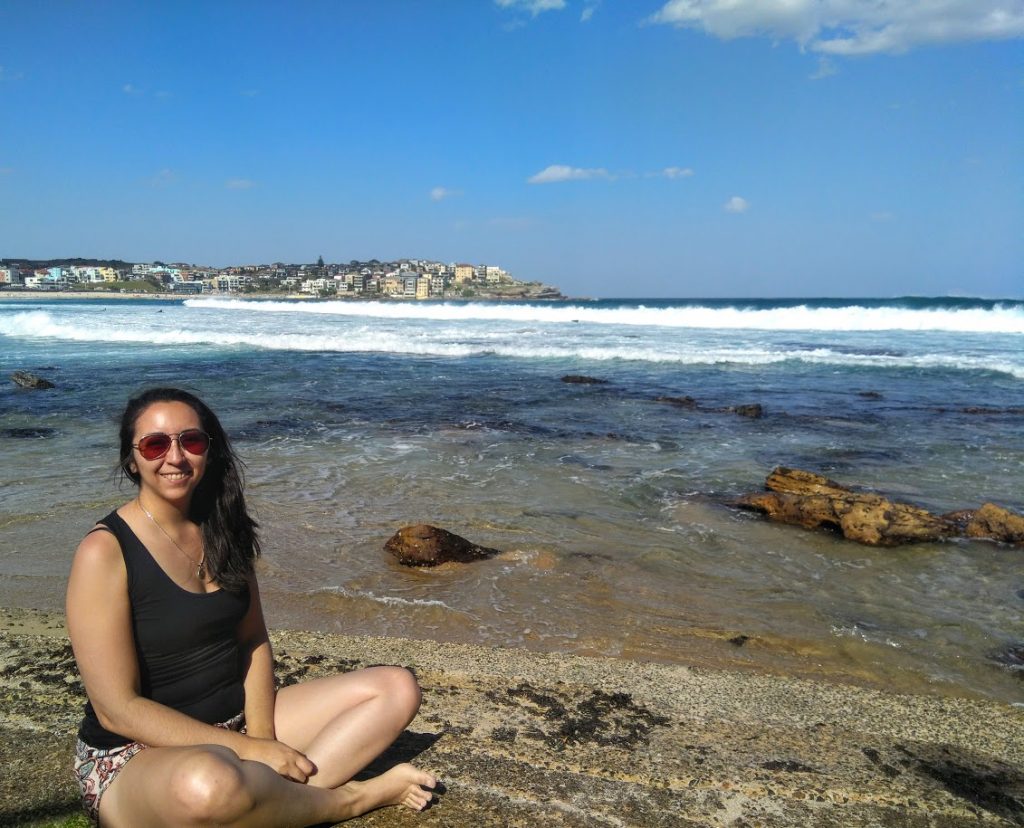
Bondi Beach, Australia
¿What did you like the most about living in these places?
What I liked the most about both of them was security. Their criminal statistics are very low and are safe countries to live and travel. I didn’t have to worry much about robberies or assaults because they almost don’t exist, particularly in some areas. I could also go back home late at night on my own and I didn’t feel unsafe, sexual harassment is not that common as in my country (that’s a sad thing to say but it’s the truth). I’m not saying it doesn’t happen at all, in fact, Broome was a particular place regarding security, but not a big deal.
The economy is something I really liked too. It is very satisfying when your income is enough to allow you to pay rent, live in a beautiful shared-house, pay your personal expenses and to save some for travelling. You can be economically stable.
Specifically about New Zealand, I really enjoyed that I didn’t have to lose time in absolutely anything because the infrastructure is very well set and works perfectly: no long lines in the supermarket, in petrol stations or on bank procedures. All those daily activities that in my country take plenty of time, in New Zealand are easy and are all automatized thanks to properly-working technology.
I also loved “kiwi” people because they are very friendly, reliable and they make you feel welcome.
In Australia, I liked its wide offer of social-life-options like restaurants, pubs, live music and so on. It’s better than in New Zealand. I also enjoyed the weather. New Zealand is very rainy whereas Australia is such a big country that you can choose what kind of weather you want to live in, you just have to move and chase summer if you want, as I did.
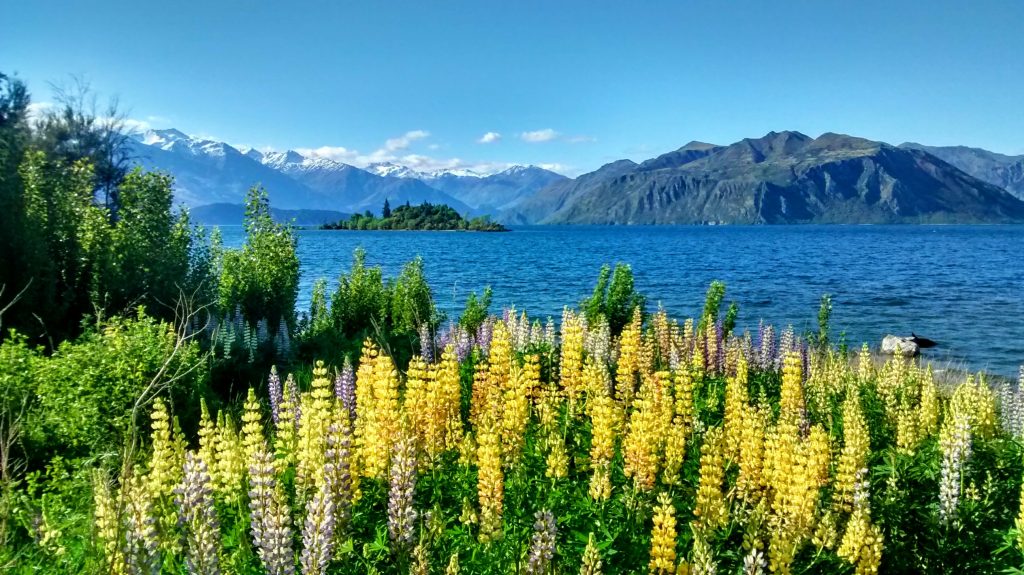
Wanaka, New Zealand
What did you like least about Australia and New Zealand?
What I didn’t like much of both countries was the food. Most of it is bland and very artificial, at least compared to Argentinian food. But, as there are a lot of immigrants, you can find excellent Thai, Vietnamese or Italian restaurants for example. I must say, between both countries, I choose Australian food and there is also a greater variety of international menus.
From New Zealand I didn’t like the weather, it changes a lot. You can have four seasons in only one day, it’s crazy. It’s quite cold, it rains a lot in almost all the country and I’m an outdoor person who loves warm weather.
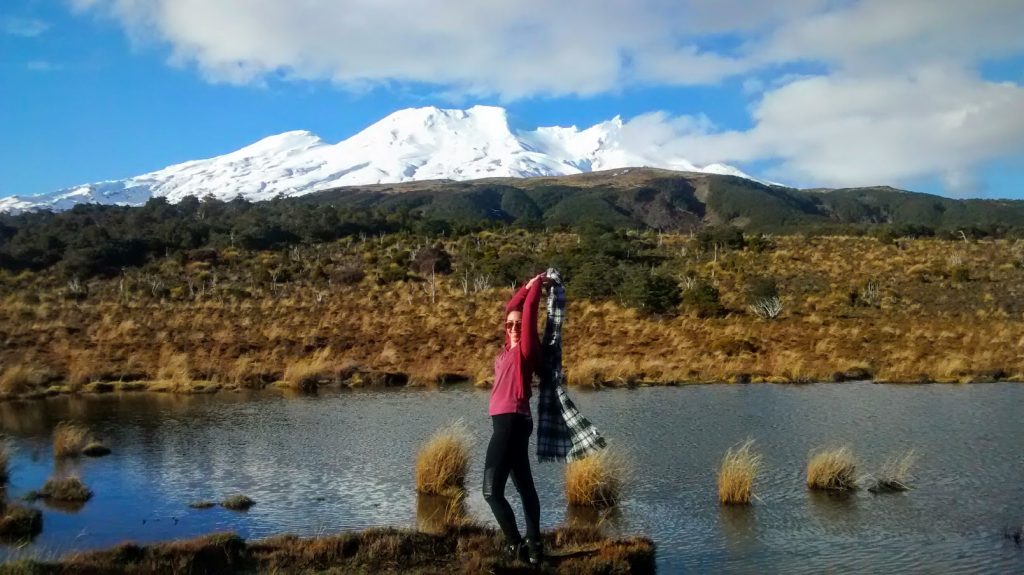
New Zealand, Ruapehu
What would you recommend to someone who wants to do their first Work and Holiday Visa?
To keep in mind that every experience is unique:
You can read blogs, make as many questions as you want on backpacker’s groups or watch video tutorials but once you are there you realize things are different from what you have been told. It’s ok to gather information and plan but your experience will be different from any other.
To embrace the new:
Be prepared for everything that may come up, be open-minded. Don’t be afraid of what “is different” to you, on the contrary, make questions, get involved to learn so that it can stop being something “different”.
To try everything you can:
New experiences, trips, different kind of jobs that you might be interested in…or not. All of that becomes into great self-knowledge, anecdotes, memories that will make you smile in the future, a personal discovery of new passions or hobbies.
To get out of your comfort zone:
It’s great to have a group of friends from your home country, it is necessary sometimes to “shorten the distance”. But I have met many people that just stay there, in a shell. They miss the chance to meet people from different nationalities, cultures, languages and backgrounds. You already know your culture and language, learn about the new environment you are in!
Don’t be afraid to speak your second language or to learn a new one, don’t be shy about it. It’s the best opportunity to practice and improve it.
To be respectful:
Of other cultures and traditions, of places, of the rules of the country, of nature and animals. Be a responsible traveller.
If you are in a group of people who speak your language and there’s at least one who doesn’t use the language everybody understands! It is rude to leave somebody out of the conversation. Just give it a thought, how would you feel in that place?
To be flexible and adaptable:
That’s the key to travelling life or relocation to a new country…or probably of life itself.
Are you thinking of travelling, studying or emigrating to Australia? Contact us today at [email protected] or contact us here to help you plan your trip. Do you want to know more about Denisse and her adventures? Follow her blog or leave us your comment below!


